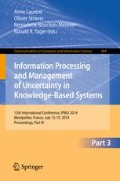Abstract
In this work we propose an extension of the DBSCAN algorithm to generate clusters with fuzzy density characteristics. The original version of DBSCAN requires two parameters (minPts and ε) to determine if a point lies in a dense area or not. Merging different dense areas results into clusters that fit the underlined dataset densities. In this approach, a single density threshold is employed for all the datasets of points while the distinct or the same set of points can exhibit different densities. In order to deal with this issue, we propose Approx Fuzzy Core DBSCAN that applies a soft constraint to model different densities, thus relaxing the rigid assumption used in the original algorithm. The proposal is compared with the classic DBSCAN. Some results are discussed on synthetic data.
Access this chapter
Tax calculation will be finalised at checkout
Purchases are for personal use only
Preview
Unable to display preview. Download preview PDF.
References
Smiti, A., Eloudi, Z.: Soft dbscan: Improving dbscan clustering method using fuzzy set theory. Human System Interaction 1, 380–385 (2013)
Ester, M., Kriegel, H.P., Sander, J., Xu, X.: A density-based algorithm for discovering clusters in large spatial databases with noise. In: KDD, vol. 160, pp. 226–231 (1996)
Ulutagay, G., Nasibov, E.N.: Fuzzy and crisp clustering methods based on the neighborhood concept: A comprehensive review. Journal of Intelligent and Fuzzy Systems 23, 1–11 (2012)
Parker, J.K., Downs, J.A.: Footprint generation using fuzzy-neighborhood clustering. Geoinformatica 17, 283–299 (2013)
Kriegel, H.P., Pfeifle, M.: Density-based clustering of uncertain data. In: KDD 2005, vol. 17, pp. 672–677 (2005)
Nasibov, E.N., Ulutagay, G.: Robustness of density-based clustering methods with various neighborhood relations. Fuzzy Sets and Systems 160(24), 3601–3615 (2009)
Yager, R.R., Filev, D.P.: Approximate clustering via the mountain method. IEEE Transactions on Systems, Man and Cybernetics 24(8), 1279–1284 (1994)
Author information
Authors and Affiliations
Editor information
Editors and Affiliations
Rights and permissions
Copyright information
© 2014 Springer International Publishing Switzerland
About this paper
Cite this paper
Bordogna, G., Ienco, D. (2014). Fuzzy Core DBScan Clustering Algorithm. In: Laurent, A., Strauss, O., Bouchon-Meunier, B., Yager, R.R. (eds) Information Processing and Management of Uncertainty in Knowledge-Based Systems. IPMU 2014. Communications in Computer and Information Science, vol 444. Springer, Cham. https://doi.org/10.1007/978-3-319-08852-5_11
Download citation
DOI: https://doi.org/10.1007/978-3-319-08852-5_11
Publisher Name: Springer, Cham
Print ISBN: 978-3-319-08851-8
Online ISBN: 978-3-319-08852-5
eBook Packages: Computer ScienceComputer Science (R0)

